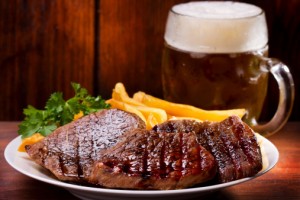

 Gout risk is higher with purine-rich foods as it increases uric acid levels. Purines are a chemical compound found in some foods. Gout is a condition that affects joints and the musculoskeletal system. It is a form of inflammatory arthritis caused by an excess of uric acid. Uric acid is the product of metabolic processes. When purines are metabolized they create uric acid, so a diet rich in purines can create an excess amount of uric acid and contribute to gout.
Gout risk is higher with purine-rich foods as it increases uric acid levels. Purines are a chemical compound found in some foods. Gout is a condition that affects joints and the musculoskeletal system. It is a form of inflammatory arthritis caused by an excess of uric acid. Uric acid is the product of metabolic processes. When purines are metabolized they create uric acid, so a diet rich in purines can create an excess amount of uric acid and contribute to gout.
Gout is often referred to as the rich man’s disease because foods high in purine, such as red wine and red meat, are deemed “rich.” Gout can very well be prevented if you become mindful of the foods you are eating. Gout can be very painful, and even a bed sheet on top of an infected joint can cause severe pain. Numerous studies link a purine-rich diet to the cause of gout.
 One study examined new cases of gout among 47,150 men with no prior history of the condition. The men were followed for 12 years. A questionnaire was used to determine if the men fit the criteria of gout, based on the American College of Rheumatology survey. Every four years diet was assessed with a food-frequency questionnaire.
One study examined new cases of gout among 47,150 men with no prior history of the condition. The men were followed for 12 years. A questionnaire was used to determine if the men fit the criteria of gout, based on the American College of Rheumatology survey. Every four years diet was assessed with a food-frequency questionnaire.
The end results of the study revealed 730 of the men developed gout. The highest risk factors for the development of gout were meat and seafood consumption. Low risk was found in those who consumed dairy products. Although purine-rich foods increase the risk of gout, no increased risk was seen in men who consumed vegetables rich in purines.
In another study, researchers conducted a case-crossover to determine the risk of purine-rich foods as they contribute to gout. This study followed individuals who were already diagnosed with gout for one year online. Participants were asked questions about gout attacks, such as when they occurred, symptoms and signs of the attack and medications they may be on, to name a few.
The results uncovered that even moderate consumption of purine-rich foods is enough to cause nearly five times as many reoccurring gout attacks. The researchers suggest that to avoid ongoing gout attacks, patients with gout should avoid and minimize their intake or purine-rich foods.
 Whether you already have gout or you’re looking to prevent the painful form of arthritis, there are food recommendations for your diet to reduce future attacks or lower your risk. Here is what you need to keep in mind.
Whether you already have gout or you’re looking to prevent the painful form of arthritis, there are food recommendations for your diet to reduce future attacks or lower your risk. Here is what you need to keep in mind.
Lose weight: Being overweight increases the risk of developing gout, so losing weight can lower your chances. Reducing calories and avoiding purine-rich foods are both good ways to lose weight.
Complex carbohydrates: Avoid complex carbohydrates; instead incorporate more fruits, vegetables and whole grains into your diet.
Water: Staying hydrated will prompt urination, which can help expel extra uric acid. Furthermore, staying hydrated has also been linked with fewer gout attacks.
Fats: Minimize saturated and trans fats found in processed goods and red meat.
Protein: Protein should be consumed in the form of lean meat, fish and poultry – there are vegetable sources of protein which you should also consider.
High-purine vegetables: Studies showed that vegetables high in protein do not increase gout risk; therefore, you can still consume such foods as spinach, beans and mushrooms.
Organ and glandular meat: Avoid meats such as liver and kidney, which are high in purines.
 Selected seafood: Research showed only some seafood can increase the risk of gout. Avoid seafood such as mussels, trout, scallops and tuna, which are higher in purines.
Selected seafood: Research showed only some seafood can increase the risk of gout. Avoid seafood such as mussels, trout, scallops and tuna, which are higher in purines.
Alcohol: Metabolization of alcohol can contribute to uric acid which causes gout.
Coffee: Some research shows that moderate coffee consumption can reduce the risk of gout. Speak to your doctor about coffee consumption if you have other medical conditions.
Cherries: Some research has linked cherry consumption with reduced gout attacks.
The below lists daily foods in our diet grouped by their risk of increasing gout and gout attacks.
Low Gout Risk: Foods with low purine levels (safe)
Green vegetables
Tomatoes
Fruit
Bread and cereal that are not whole-grain
Butter, buttermilk, cheese, and eggs
Chocolate and cocoa
Coffee, tea, and carbonated beverages
Peanut butter and nuts
Low-fat or non fat milk
Low-fat yogurt
Moderate Gout Risk:Foods with moderate purine levels (eat occasionally)
Fish and seafood (aside from those listed in the high-purine section)
Oatmeal, wheat bran, and wheat germ
High Gout Risk: Purine-rich foods (avoid)
Organ meats, liver, kidney, sweetbread and brains
Meat, bacon, beef, pork, and lamb
Any meat in large quantities
Anchovies, sardines, herring, mackerel, and scallops
Gravy
Beer
14 natural remedies for gout pain
Gout pain can be debilitating, so using natural remedies can offer gout suffers much relief. Gout is a condition characterized by a buildup of uric acid. Uric acid is the result of purines breaking down, which are found naturally in the human body as well as in food. Continue reading…
Natural remedies for gout
One particular type of arthritis targets the joints and tissues around the large toe and foot. This form of arthritis is called gout and it can be quite painful. Attacks of gout can happen sporadically, but they usually occur soon after waking up or during the night. Continue reading…
Copyright © www.orthopaedics.win Bone Health All Rights Reserved